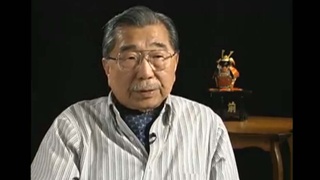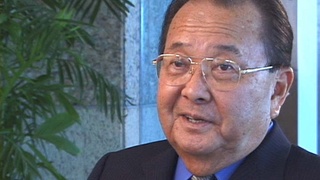Interviews
Basic Training
I did extremely well in basic training; I think I was born with the attributes to be a soldier…but I was the best shot in the whole group and I never had a gun in my hand before I joined the army and so like the sarge says,” what are you doing?” you know, cause I hit 10 bulls eyes in a row. I said, “I don’t know what I’m doing, just what you people told me to do!” [laughs] But despite that record, when I finished, you know, the first sergeant told me I could be a cook or clerk or a mechanic. I said,” well why can’t I be a regular soldier? I did very, very well, and I think I came out second in the whole group and I says, out of all of us in basic training” and I says, “why can’t I be a regular soldier?” He says," now, now, now, wake up, wake up," he says, “you got the wrong shaped eyes, you got the wrong skin”, he says," everything is wrong, he says,” you can’t be a soldier, people like you aren’t soldiers.”
Date: August 28, 1995
Location: California, US
Contributed by: Watase Media Arts Center, Japanese American National Museum
Explore More Videos

Government sold Japanese Canadian properties for little money
(b. 1928) Doctor. Former Chair of the Japanese Canadian Redress Foundation.

Questioning Curfew
(1918-2012) Fought the constitutionality of Executive Order 9066.


Challenges of finding a summer job
Judge, only Japanese American to serve on CWRIC.




Loyalty questionnaire
(1916-2010) draft resister, helped form the Heart Mountain Fair Play Committee

Speaking out in camp
(1916-2010) draft resister, helped form the Heart Mountain Fair Play Committee

Draft resisters sent to jail
(1916-2010) draft resister, helped form the Heart Mountain Fair Play Committee

Would do the same again
(1916-2010) draft resister, helped form the Heart Mountain Fair Play Committee

Lost respect for the flag after incarceration
(1913-2013) Doctor specializing in obstetrics in Southern California

Traumatic experiences before camp
(1913-2013) Doctor specializing in obstetrics in Southern California

Joining the hospital unit in Santa Anita Race Track
(1913-2013) Doctor specializing in obstetrics in Southern California

“Everybody went in like sheep”
(1913-2013) Doctor specializing in obstetrics in Southern California
